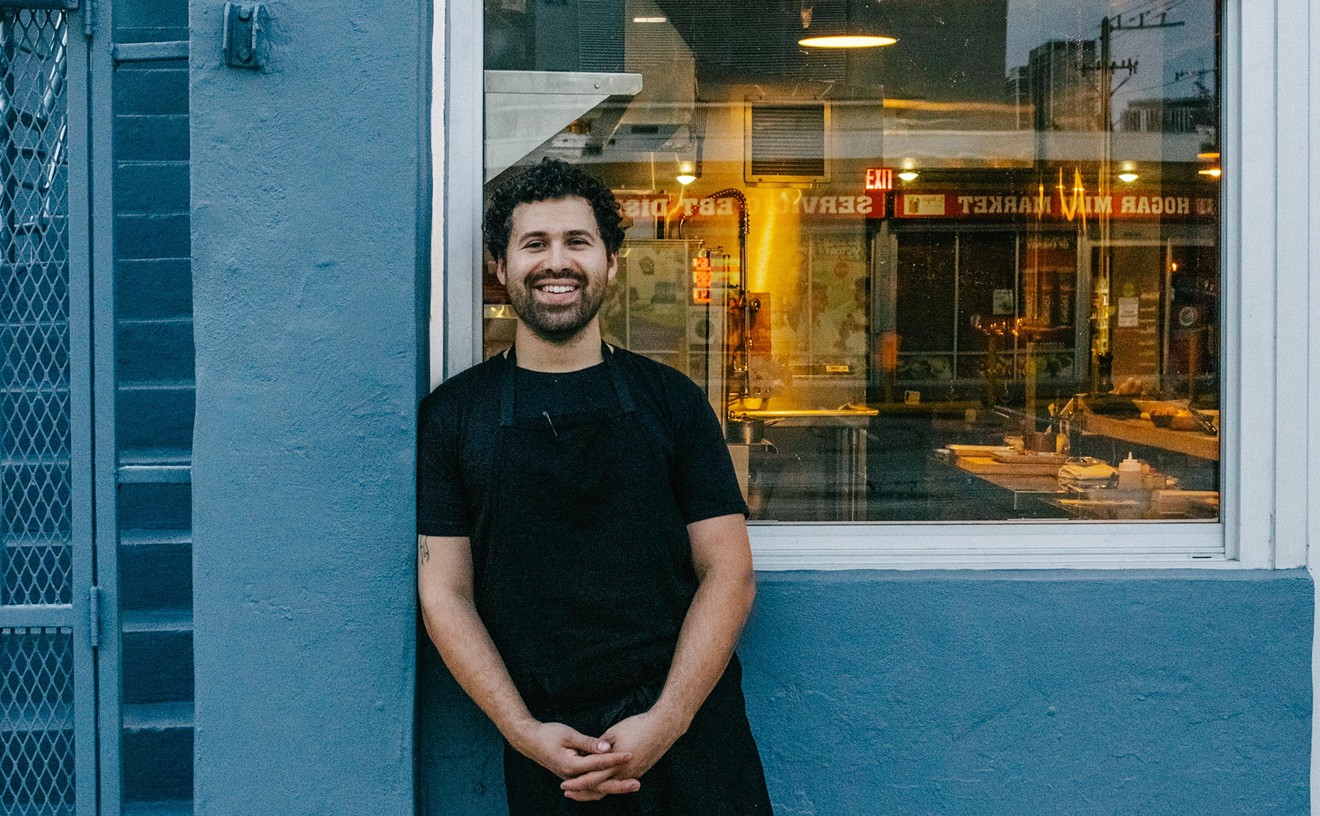Since their early days, Matt Kuscher's beloved burger and sandwich spots — Lokal and Kush — have been the end of the rainbow for beer fans seeking new or rare releases from local and national breweries. Yet suds aren't his obsession. For that, you have to pull out a bottle of mead or cider, particularly the funky, tart apple brews of northern Spain, to put a glimmer in his eye.
To understand why, you have to go back more than a decade in the life of the ginger-bearded restaurateur. At the age of 21, he moved to Spain. And there, in the bars of small towns across Asturias and elsewhere, was where he first witnessed the long pour. It's when a bartender dribbles a tiny amount of the region's favorite drink into a small glass to give a touch of effervescence. But this wasn't the kind of sugary, headache-inducing cider found in America. This was European cider, which often tastes closer to a blend of a well-balanced white wine with a sour beer.
"Unless you're prepared, you're not going to like it," Kuscher says while sitting at the bar of his latest project, the Spillover. "By the third or fourth glass, it'll start growing on you, like blue cheese or caviar." But once the hooks are set, they hold.
A sizable troupe of bottles of cider and mead sits on the bar in front of him. The first thing he opens is northern Spain's Mayador; he doles it out with a long pour. As promised, it's full of funk. Stick your nose into a snifter for a sip, and you're met with the odor of sweaty feet. But that doesn't carry over the cider itself. Inside, it's slightly tart and dry. And in stark contrast to the ciders most Americans are accustomed to, it's barely sweet. "In America, ciders can have up to 50 percent or more added sugar," Kuscher says. "In places like the UK, there are regulations saying you can't have more than 10 percent added sugar."
Then he moves on to a bottle from Brittany called L'Hermitière. This is an easy drinker, but not dumbed-down. There's a light richness, akin to Spain's cava. There's also a touch of sugar. Cider is a pairing drink, Kuscher notes, and his menu is designed around it.
His drink lineup is as much a Spillover specialty as the pan con minuta or alligator ribs. After securing his first two restaurants' positions as must-stops for any beer enthusiast, he decided it was time for Miami to smarten up to cider and mead as the rest of the nation also comes around to these ancient drinks.
"The same way you go to a Japanese restaurant and order sake or a Mexican restaurant and order tequila, I want there to be no question that you're going to come here and have a cider or mead," he says. And it seems like he's making some headway. Just a few days ago, a customer called to find out which meads were in that day's lineup.
Though imbibed for millennia around the globe, cider — and the honey wine called mead that could be made with a wild array of ingredients — seems to be making a return, in the States at least. Kuscher says beer and wine distributors have trouble categorizing the two and thus don't promote them. But in recent years sharp-nosed bartenders and drinkers have become enamored. Bloomberg recently declared meads, that booze you probably first heard about when you read Beowulf in middle school, "not just for hobbits anymore." Cider and mead bars are cropping up across the nation. The American Mead Makers Association declared its flagship the fastest-growing alcoholic beverage category in the country, if measured by number of producers.
At the Spillover, much of the mead is left to general manager Colin Speer. He didn't know much about the drink when he and Kuscher began planning this place nearly two years ago. The long lead time turned out to be a happy accident, allowing Speer to travel the state and country learning and making plenty of the stuff. In no short time, a tasting becomes a kind of science lesson. A mead made with spices or herbs is called a metheglin, he explains. A mead fermented with fruit is a melomel. A great mead is one that's been aged several years.
Historically, however, meads were used as a way to preserve perishables' nutrients for future consumption. "That's why you see so many varieties," Speer says. People often think of meads as cloying, syrupy concoctions akin to port wine. And, indeed, the Spillover sells an intensely sweet Scandinavian variety called Viking's Blod with 18 percent alcohol. But that's just where things start.
He pulls out a trio of bottles from South African meadery B. United International. They're light, easy drinkers. One made with white figs is less sweet than expected and instead fills your head with woody, nutty notes. A bird's-eye chili variety is nearest in flavor to an acidic Riesling. The chili leaves only a slight burn in the back of your throat. Ohio's Crafted Artisan Meadery puts out a mojito-inspired brew that tickles with mint. Another, made with blackberries and then dry-hopped like a beer, has delicate floral notes as though it were constantly spritzed with rosewater as it fermented.
So much variety is daunting at first, but it's no more expansive than wine. And though prices for certain meads and ciders at the Spillover can approach $200, there's no shortage of options on draft. Additionally, the bar keeps several of the fancier bottles opened, and you can get a one-ounce pour for as little as $5. The key, though, is to get Kuscher and his team talking about the stuff. And if you're lucky, they'll pull out a few special bottles to help explain.
For more, follow Zach on Twitter or Instagram.
[
{
"name": "Air - MediumRectangle - Inline Content - Mobile Display Size",
"component": "19274298",
"insertPoint": "2",
"requiredCountToDisplay": "2"
},{
"name": "Editor Picks",
"component": "17482312",
"insertPoint": "4",
"requiredCountToDisplay": "1"
},{
"name": "Inline Links",
"component": "18711090",
"insertPoint": "8th",
"startingPoint": 8,
"requiredCountToDisplay": "7",
"maxInsertions": 25
},{
"name": "Air - MediumRectangle - Combo - Inline Content",
"component": "17482310",
"insertPoint": "8th",
"startingPoint": 8,
"requiredCountToDisplay": "7",
"maxInsertions": 25
},{
"name": "Inline Links",
"component": "18711090",
"insertPoint": "8th",
"startingPoint": 12,
"requiredCountToDisplay": "11",
"maxInsertions": 25
},{
"name": "Air - Leaderboard Tower - Combo - Inline Content",
"component": "17482313",
"insertPoint": "8th",
"startingPoint": 12,
"requiredCountToDisplay": "11",
"maxInsertions": 25
}
]










